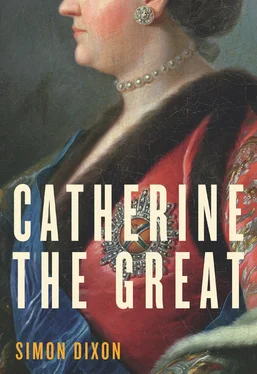The sole consolation for the pro-Prussian party was their success in persuading Elizabeth not to cancel plans for Sophie’s wedding. Though Lestocq had feared the worst when the scandal broke, the empress had invested too much political capital to send the girl packing now. The sooner she married, the sooner Russia could be rid of her meddlesome mother, and the sooner the succession could be secured. Since the couple were not yet formally engaged, and a crucial precondition of their betrothal was Sophie’s conversion to Orthodoxy, it was all the more pressing to complete her induction to the Russian faith. Frederick, who feared that her stubbornness in matters of religion would be the greatest stumbling block to the whole project, was confident that she could be brought round by careful persuasion. To make the task as painless as possible, her conversion was entrusted to Archimandrite Simon (Todorsky), a monk who had studied in Halle, the nerve centre of the Pietist religion in which she had been raised. Only 29 of his 800 books were in Russian, the overwhelming majority being in German, Latin and Greek. 48At a time when Orthodox theologians depended so heavily on Western scholarship, it was not so difficult to argue that the two faiths were separated more by external rituals than by essential doctrine. Simon assuaged any anxieties on the former score by ascribing the Russian Church’s famously flamboyant rites to popular superstition. He probably did not have to work very hard. Sophie’s acceptance of Orthodoxy is the first clear sign of her lifelong grasp of the realities of power. Since there was plainly no alternative, she wrote coolly to her father at the beginning of May that because she could detect ‘hardly any difference’ between Orthodoxy and Lutheranism, she had already resolved to convert. 49
Following her first visit to the Trinity monastery later that month, she settled down to prepare for her baptism. Like the great majority of the Orthodox episcopate until the 1760s, Simon was a Ukrainian whose pronunciation proved controversial when she came to learn the creed. (The poet and versifier Alexander Sumarokov later blamed the ‘shameful’ influence of Ukrainian bishops for the ‘incorrect and provincial dialect’ allegedly adopted by the Russian clergy as a whole.) 50Sophie, who was given a German translation to ensure that she grasped the meaning, eventually opted to recite the Slavonic text ‘parrot-fashion’ in the Russian diction recommended by her language tutor, Vasily Adodurov, a likeable writer and grammarian twenty years her senior who was to become a valued friend and confidant. ‘Otherwise you will make everyone laugh with your Ukrainian pronunciation,’ Peter warned. 51On the appointed day, Thursday 28 June, Elizabeth had the girl dressed in scarlet and silver to match her own costume and led her in solemn procession through packed antechambers to the chapel of the Summer Annenhof. Sophie was left kneeling at the door while the empress went in search of the abbess of the Novodevichy convent, chosen as the new convert’s baptismal sponsor in the face of fierce competition among the Court ladies. (Having already performed this function for her nephew, Elizabeth was unable to repeat the honour for Sophie since by Orthodox tradition those who have the same baptismal witness are unable to marry.) When the ritual finally began, the girl knelt on a red cushion to receive the blessing of Amvrosy (Iushkevich), who had less than a month to live as archbishop of Novgorod. (This was the same ‘bigoted or corrupt prelate’ to whom Frederick the Great’s ambassador, Baron Mardefeld, had offered a bribe of 2000 roubles to overcome the Holy Synod’s scruples about a match between two such close relatives, with a promise to ‘triple the dose’ when the deed was done.) 52Then Sophie stood to declaim the confession of faith in words that she did not yet understand before reciting the creed from memory to a tearful congregation. If critics detected any failings in her confident performance, then they kept their opinions to themselves. Those who had most to lose were keenest to praise her achievements. Sophie was ‘a heroine’, Mardefeld declared. Johanna Elisabeth was predictably emotional: ‘I was already so overcome in advance that I burst out crying before she had reached the end of the first word.’ 53
On her acceptance into the Russian faith, Princess Sophie Auguste Friderike at last became Yekaterina Alekseyevna, a name chosen by Elizabeth in honour of her own mother, Catherine I. That night, after receiving yet more diamonds from the empress and allowing courtiers to kiss her hand for the first time (a formal ceremony which lasted almost two hours), Catherine and Peter drove incognito across Moscow to the Kremlin in preparation for the following day’s betrothal service on the feast of Sts Peter and Paul. 54After morning prayers in her apartments, they processed through the Palace of Facets and out onto the Red Staircase exactly as she would eighteen years later at her own coronation. Before the liturgy in the Dormition Cathedral began, Elizabeth placed engagement rings on the fingers of her heir and his fiancée. Now Catherine had a new title—grand duchess—as well as a new name. As cannon fired to signal the moment to the expectant crowd, the liturgy began, culminating with a sermon by Metropolitan Arseny of Rostov, the only prelate who protested against her secularisation of the monastic lands twenty years later (he paid the price with lifelong monastic imprisonment). At lunch in the Palace of Facets, Elizabeth sat beneath a canopy at the centre of her customary dais with Peter to her right and Catherine to her left. As always at a Russian banquet, there was a series of elaborate toasts. The empress toasted her heir; he returned the compliment; she toasted his new fiancée before finally raising her glass to all her loyal subjects. More festivities followed in the evening so that it was half past one in the morning before the exhausted couple started the journey back to the Golovin Palace. Elizabeth stayed up even longer to watch the fireworks on the Ivan the Great bell tower. 55Relieved to hear of the triumphant conclusion of his schemes, Frederick the Great laid on the flattery with a trowel:
I count it among the finest days of my life to have seen the elevation of Your Imperial Highness to this high rank. I am happy to have contributed to it and pleased to have rendered service to my dear ally, the empress of Russia, and all her vast empire by procuring a princess of your abilities, Madame, as a bedfellow for the Grand Duke. 56
Though they were not quite yet ready to sleep together, Catherine and Peter seem initially to have got on well enough, and until the Court set out for Kiev at the end of July after celebrating the peace with Sweden, Catherine had seen little of the empress’s irascibility. 57It was only at close quarters on the journey south that cracks in their relationships began to appear. Delayed by inaccurate mileposts, which she insisted must be replaced later that year, Elizabeth was in a foul temper by the time she caught up with the young couple at Razumovsky’s estate at Kozelets, where Johanna Elisabeth had her first serious argument with Peter. They relieved the tension by gambling for high stakes for a fortnight. 58
On arrival at Kiev in the last week of August, Catherine had her first taste of the embarrassment caused by over-eager subjects. When they went to see a theatrical performance staged in the grounds of a nearby convent, where they had to pass through the chapel to reach their seats, it became clear that they were in for a long evening:
There were prologues, ballets, a comedy, in which Marcus Aurelius hanged his favourite, a battle in which the Cossacks defeated the Poles, a fishing scene on the Boristhène [the River Dnieper], and choruses without end. The empress kept her patience until almost two in the morning, when she sent someone to ask if it might finish soon. She was told that they were not yet half way through, but that if Her Majesty ordered it, they would stop straightaway.
Читать дальше












